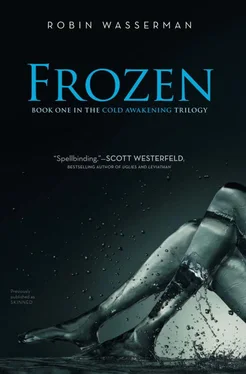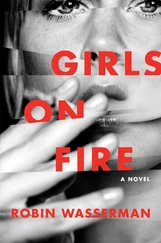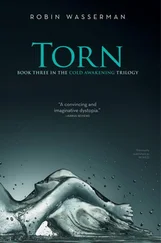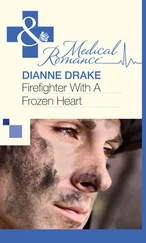“She asked,” my father said. “She should know.”
The doctor hesitated, as if waiting for them to reach a unanimous decision. He’d spent the last month with my parents and still thought the Kahn family was a democracy?
My father nodded. “Continue.”
The doctor, smarter than he looked, obeyed. “Third-degree burns covering seventy percent of your body. That was the most immediate threat. Skin grafts are simple, of course, but in many cases infection proves fatal before we have the chance to do anything. Crush injuries to the legs and pelvis. Spinal cord abrasion. Collapsed lung. Damage to the aortic valve necessitated immediate bypass and may have required an eventual transplant. Internal bleeding. And, as far as secondary injuries, we were forced to amputate—”
“Please,”the computer voice cut in. It was so calm.
My father raised his eyes, waiting. Believing I was strong enough.
Keep going, I forced myself to think. The words were in the air before I could take them back.
“Amputate the left leg, just below the thigh. Several hours were spent trying to salvage the left arm, but it wasn’t possible.”
There were two feet beneath the blanket. Two legs. I could see them. Maybe I couldn’t feel them or move them, but I knew they were there.
Prosthetics, I realized, retreating to a part of my brain the computer couldn’t hear. They can do a lot with prosthetics. They made fake limbs that moved, that even, in some way, felt. That looked almost normal. Almost.
The doctor had said I would walk. He just didn’t say how. He didn’t say on what.
This can’t be happening to me.
How could it be happening—how could it keep happening—and still seem so unreal?
But then how could it be real? How could I, Lia Kahn, be a one-armed, one-legged, burned, scarred, punctured lump ?
“I need to see.”
“See what, Lia?” my mother whispered. What did she think?
“See. I need to see what I look like. I need a mirror.”In my head I was shouting. The voice was not.
“That’s not advisable at this point,” the doctor said. “I only told you about your injuries so you would realize how lucky you are to be making a full recovery. So you would understand that certain decisions were made for your own good. Some sacrifices were needed to save your life.”
Some “sacrifices,” like an arm and a leg?
“I need to see.”
The doctor frowned. “We really should wait until the final, cosmetic procedures have been completed. It’s ill-advised at this stage to—”
“Let her see,” said a man who hadn’t spoken yet. He stood closest to my parents, his gray suit flashing, very subtly, in time with his heartbeat. The style had been in and then very definitely out a couple years ago, but it worked for him. Although with his face—chiseled cheekbones, long-lashed brown eyes, dimpled chin, nearly-but-not-quite feminine lips—anything would have worked. “She’ll have to find out eventually. Why not now?”
I was sorry I couldn’t smile at him.
Then I reminded myself that the smile would have been bound by blistered lips, pulled back to reveal cracked teeth, or dark empty gaps, along bloody gums. As for the blond hair I would have liked to flick over my shoulder, just quickly enough that the scent of lavender wafted out to greet him? It was probably gone. I’d smelled it burning. My eyes were both still there, that was obvious. At least one of my ears. But my mouth didn’t work, my nose didn’t work—Who knew whether they were intact or just sunken caverns of flesh? The pretty doctor didn’t see pretty Lia Kahn, I reminded myself. He saw the lump.
He found a mirror.
It was small, about the size of a hand stretched flat, with the fingers pressed together. Framed with black plastic that maybe was supposed to be shiny but wasn’t, not anymore. He paused, tipped his head toward my father. “Do you want to…?”
My father shook his head.
So it was the pretty doctor, the kind of guy Walker would be someday if he remembered to shave and stopped flunking gentech, who approached, mirror in hand. He kept it angled safely away. “You ready?”
As if it mattered. I closed my eyes.
The computer said yes.
They’ll fix it, I promised myself. No matter how much it costs, no matter how long it takes. If my mother could keep her skin looking like she was twenty-two, if Bliss Tanzen could show up with a new nose to match every new season’s shopping spoils, a few scars were nothing. Maybe I’d even keep a couple. Becca Mai had a delicate white fault line running down her cheekbone that she claimed came from a close encounter with jagged glass on some illicit venture into the city. Everyone knew Becca Mai was too prep to sneak out of the house and too petrified to sneak into the city, and Bliss had spotted one of those home tattoo kits on Becca’s shop-log, just before it mysteriously got edited out. But guys still loved her sexy little shiver as they traced their fingers down the scar. Becca gave good shiver.
I could do better.
“Lia, if you want to see, you’re going to have to open your eyes.” The doctor’s voice didn’t quite match up to his pretty face. I liked voices lower, a little husky. Of course, Walker was nearly a tenor. Carved cheekbones, a tight six-pack, and a girl can get used to just about anything.
Anything, I told myself. And then, deep breath.
Eyes wide open.
I didn’t know computers could scream.
“I was a ghost in the machine.”
The lips, I thought. Focus on the lips.
Because they were normal. Pale pink, washed out. Curved into a half pout. A glimpse of white teeth barely visible, straight and whole. It was a mouth, a normal mouth.
Just not my mouth.
The nose, too. It was a nose. Narrow, nearly sharp but not unpleasantly so, no bumps or hooks, delicate nostrils, a gentle slope up the face toward the—
No, not the eyes.
Don’t look at the eyes.
No scars. No burns. It wasn’t the Halloween fright mask I’d imagined. It was… perfect. The skin was unmarked, stretched taut and smooth across the face. A stranger’s face.
And the eyes. The eyes that weren’t my eyes. Pale, watery blue, unspeckled iris; black, motionless pupil; and at the center, a pinprick circle of amber. Unblinking. Dead.
But when I closed one eye, the eye in the mirror closed, too. Brown lashes brushed against a too-smooth cheek. I opened the eye, and the mirror eye opened. It was dead. It was mine.
Which meant that what lay above it was mine, too. Blondish brows with a high, perfectly plucked arch, like they’d been penciled in. A wrinkle-free forehead. And above that?
The machine.
Scalp flayed back. A mess of circuitry, like when Zo was five and cracked open my new ViM because I wouldn’t let her use it. Wires spooling out of my head. Wires feeding into my head. Silvery filament crisscrossing a waxy, flesh-colored base.
It wasn’t until the computer fell silent that I realized I was still screaming. But now the screams were just inside my head.
What else was inside my head?
“Try to calm down,” said the first doctor, the ugly one. The mirror was gone, but I couldn’t stop seeing the face. “I’ll turn the speaker back on, but you have to stay calm, for your own good. Let us explain. Can you do that?”
As if I had any choice.
One blink.
I forced the screams back inside myself.
“This is why I didn’t want you to see at this stage,” the doctor said irritably. “Cranial exposure is only necessary until we confirm neurological stability. Once the skullcap is attached and the hair—”
Читать дальше












